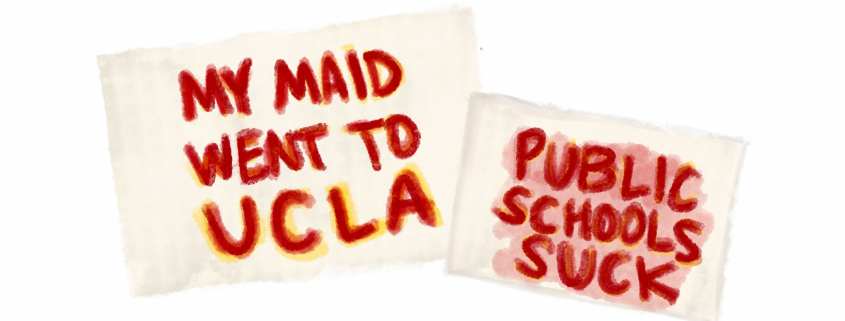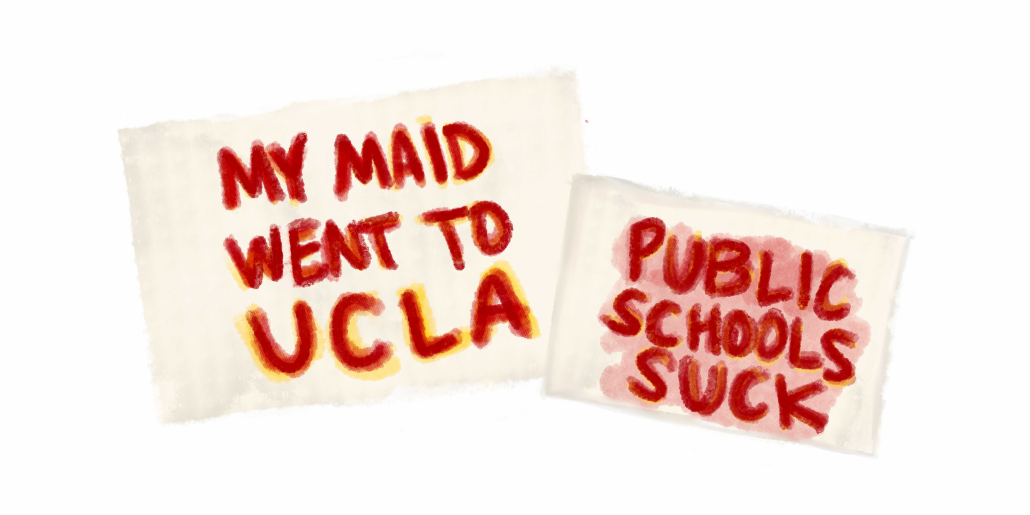Students’ rivalry trash talk is classist
Instead of a week filled with friendly and lighthearted banter, Conquest Week revealed USC’s embarrassing, unspoken sector — the University student body’s rampant classist and ignorant views.
On the day of USC and UCLA’s annual football game, posters containing offensive and classist rhetoric permeated USC’s campus and students’ social media platforms. Students posted derogatory statements, such as “Your dad works for my dad” and “You can’t afford us” as jabs to UCLA students for attending a public school.
This type of rhetoric not only poorly reflects on the student body and USC’s values but also fuels negative stereotypes, which stain the University’s reputation as a diverse and equitable institution.
However, this classism is not new. USC’s vexatious nickname, “University of Spoiled Children,” paints the stereotypical Trojan as affluent and entitled, coming from rich trust fund families who pay the University’s high tuition prices.
Although merely caricature of the typical Trojan, these stereotypes, unfortunately, hold true during moments such as these, reflecting many students’ pompous and arrogant attitudes especially when displaying statements that belittle low-income students.
These words may be aimed at the Bruins, but such rhetoric also harms low-income students at USC who rely on financial aid and merit scholarships to afford higher education. Approximately two-thirds of USC students receive some degree of financial aid, and more than 4,100 enrolled undergraduate students come from low-income households.
Allowing these statements to exist without backlash establishes a toxic, pervasive culture of shallow values, placing significance on socioeconomic status and discriminating based on financial footings. Students continually engaging in this unacceptable behavior perpetuate the student body’s superficial atmosphere of materialism and conceited attitudes.
This offensive rhetoric not only harms low-income students but also paints a horrid picture of USC consisting of privileged and ignorant students. Instead of being funny or humorous, these signs depict unsophisticated and unworldly college students, unaware of their entitled attitudes and once again serving as an embarrassing representation of Trojan values and ethics.
With students openly flaunting their elitism across various social media platforms, this portrayal of our school can also impede future students who wish to attend USC. By creating an exclusive atmosphere within a school that preaches diversity and equity externally, current students deter potential applicants from associating with such an elitist institution. Although our school has a prestigious reputation, its reputation as a controversial institution is growing.
Additionally, this behavior highlights the University’s failures in confronting and addressing class discrimination, which reveals USC’s twisted priorities in regulating student behavior. The silence on the administration’s part — whether or not they were aware of such statements — speaks volumes about this topic and sends a message to every low-income student that the University condones elitist behaviors and attitudes.
Students posing in front of such statements to goad UCLA lands more poorly on our own school than it does on the Bruins. Anyone who stands for this type of ignorance should be deeply ashamed, continually reflect on their privilege and question why they believe this type of behavior is acceptable or justifiable.
Whether or not students made these statements in good taste, insulting a demographic by making socioeconomic status the butt of a joke only reveals the true losers of the perpetual rivalry. The USC community should be embarrassed by letting our ignorance spiral out of control of what should have remained a healthy, rivalrous banter.
After a slew of recent controversies, let us not add fuel to the fire with discriminatory language but instead check our privilege and do better as students. Individuals are more than their material wealth, and such superficial attitudes have no place at a diverse and unprejudiced institution.


